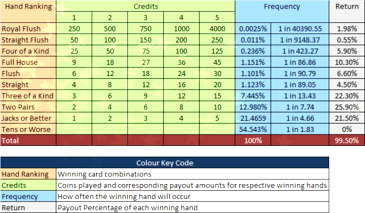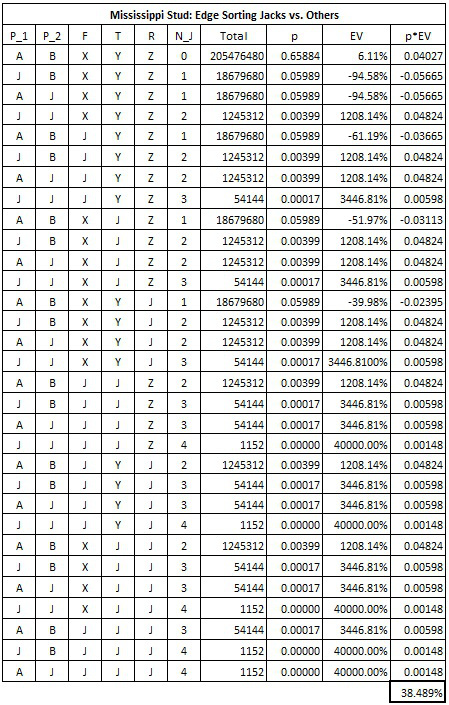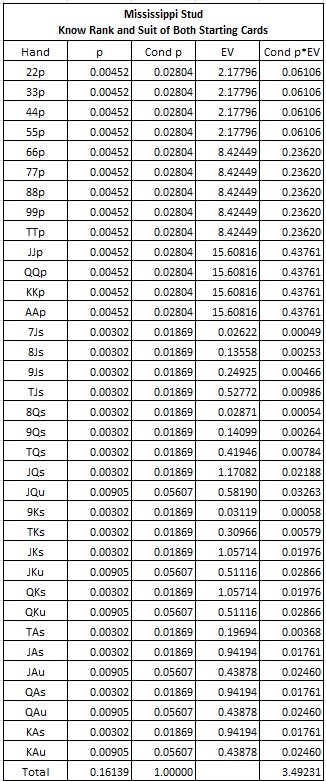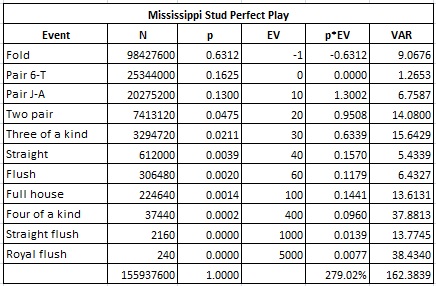Mississippi Stud Tips
Posted : admin On 4/12/2022With the massive success of tribal mega-resort casinos like Mohegan Sun and Foxwoods Resort, people might get the idea that all Native Americans are rich thanks to tribal gaming. But after sorting through a long laundry list of regulations, administrative salaries, and strict profit distribution rules, not many come out with a windfall of cash.
In this video, Michael Shackleford, who is also known as the 'Wizard of Odds,' explains all about Mississippi Stud. He tells you how the game is played, the various bets you can make, the casino advantage on those bets, and the best strategy for playing the game on a pre-flop basis, as well as advice for making the later bets.
- Mississippi Stud Poker free download - Mississippi Stud Poker, Draw Poker for Windows, 7 Card Stud Poker, and many more programs.
- Introduction to Mississippi Stud – Rules, Bets, Tips & More Mississippi stud is another popular poker game. This table game is quite simple to play as the rules are straight forward. Besides, winning is based on the power values of the final five cards that the player has in his hands.
How Tribal Casinos Were Legalized
In the 1970s the Seminole tribe of Florida opened a high-stakes bingo operation, which quickly caught the attention of Florida authorities. As gambling was illegal in Florida at the time, they tried to shut down the game. After appealing to the Supreme Court, the Seminoles won their right to gamble on their own reservation lands (which are federally-granted territories within states), and that states did not have to right to meddle in reservation affairs.
With a few landmark court decisions involving tribes in Florida and California, the stage was set for Native American gaming. But that doesn’t mean the millions started flowing overnight –setting up tribal casinos involves tribal compacts with the state, casino licensing, and most of all: lots of money.
Barriers to Entry
There are 562 federally-recognized tribes in the U.S., but only 200 operate casinos. Some refuse to participate due to their beliefs, while others simply lack the resources to finance a large casino. The rules of tribal gaming say that casinos must be owned by the tribe, not outsiders. This is to ensure that organized crime elements don’t gain a foothold, but it also follows state laws regarding the operation of casinos on reservations.
Over 150 tribes are seeking federal recognition right now, though many say they are just looking to cash in on the tribal gaming action. The 1988 Indian Gaming Regulatory Act (IGRA) also says that individual Native Americans cannot operate casinos, only tribes can operate casinos. Tribal gaming is not an individual right, but a government action, which involves tribal leaders as well as state and federal officials.
Contrary to popular belief, not all tribal casinos are mega-resorts like Foxwoods Resort, one of the largest casinos in the world. Many tribal ‘casinos’ are merely smoke-filled trailers with a few table games, hardly a money-making machine. The prohibitive cost of building casino resorts keeps the majority of Indian reservations off the casino map.
Casinos are also separated by classes, and Class III casinos have the most stringent hoops to leap through. In addition, reservations located in remote areas far from major cities do not usually develop casino resorts. Tribal casinos can receive support and investment from other tribes (like the wealthy Seminole tribe, which owns the Hard Rock International brand), but investors usually choose reservations near state lines or densely-populated areas for maximum drawing power.
Many Fingers in the Pie
Once a tribe finally has the paperwork and cash to embark on a casino project, the tribal leaders must still get together to determine how the money is distributed. And it is not distributed equally. Just because an individual is a member of a tribe which operates a casino does not mean they receive a free cut of the cake.
Tribal-State compacts are agreements which outline the rules and regulations for operating tribal casinos. Each state has different conditions, licensing fees, and percentages of the profits. While states can’t officially ‘tax’ reservations, they usually just couch their cut in language like ‘licensing fees’ and ‘slots revenues.’ As part of their deal with the State of Connecticut, Foxwoods Resorts pays 25% of its slot revenue to the state. Since the resort is 4.7 million square feet, with 380 gaming tables and 6,200 slot machines, the state does take a sizable bite of the profits.
Also, in the rare cases where individual tribe members each receive a payment from the profits, the federal government takes its own tax out of these payments.
Strict Rules
After the state takes its cut and all expenses are paid, any net profits are subject to strict rules regarding distribution. According to the IGRA, gaming net profits can only be used in the following ways:
1) Fund tribal government operations or programs
2) Provide for the general welfare of their members
3) Promote tribal economic development
4) Donate to charitable organizations
How To Play Mississippi Stud
5) Help fund operations of local government agencies
If a particular tribal council wants to hand out individual payments to members of the tribe, they must get approval from the Secretary of the Interior. Of the 200 tribes operating casinos, only 70 tribes give per capita payments from gaming revenue. And of these few tribes, the payments range from a few hundred dollars to a few thousand dollars per year; hardly the cash windfall many people imagine.
Exceptional Cases

Fortunately for some of the poorest members of a tribe, some casinos have decided to ‘provide for the general welfare of their members’ via direct payments. In very few exceptional cases, these payments have even been large enough to be life changing.
According to a long-term study on the Eastern Band of Cherokee in North Carolina, researchers saw a profound change in the lives of tribe members who received regular casino payments. In 1992, Duke University researchers began to study the effects of poverty on the Cherokee families in Cherokee, North Carolina. When the tribal casino came along, promising to disburse payments to their tribe members, Professor Jane Costello saw the opportunity for a “natural experiment” as a result.
The Eastern Band of Cherokee Native Americans opened a casino in the area, and promised all 15,000 tribal members an equal cut of the profits. The first casino was more of a glorified arcade of slots along a forgotten highway, and the first payments came to a single yearly payment of only $595 for each member of the tribe.
But the casino has grown, and in 2016, every tribal member received around $12,000. The casino also sets aside payments for Cherokee children, to be cashed out when they turn 18. Some young Cherokee adults found over $100,000 waiting for them, enough to fund college education, business interests, or investment in the future.
A Bigger Truth
When Professor Jane Costello of the Duke University Center for Child and Family Policy analyzed the results of years of research, she discovered a bigger truth. By studying the long term effects of poverty on children, she found marked improvement in the mental and emotional well-being of Cherokee children whose families received payments of only $4,000 per year.
Professor Costello applied detailed psychological assessments of adolescent Cherokee children and continued the comparisons through adulthood until age 30, and compared these results to children who had never been poor. Children at the poorest levels were prone to violence at home or school, behavioral disorders, anxiety, depression, and substance addiction.
But the children whose families received regular money from the tribal casinos showed a 40% decrease in behavioral problems as well as fewer drug and alcohol issues. When the research began, Costello did not think that the small amounts of casino money would make a difference in what she saw as “such a pit of poverty.”
After witnessing the major changes in the lives of the Cherokee families who received unconditional cash transfers, Costello found evidence of the effects of a larger political experiment: a universal basic income. “I suddenly thought, ‘Oh my god,’” Costello said.
Pay Now or Pay Later
Professor Costello’s research led to a testimony before the U.S. Senate Committee on Indian Affairs regarding the importance of investing in children. In addition to a decrease in behavioral problems associated with poverty, the Cherokee children who received tribal casino money had fewer teen pregnancies, were more likely to finish high school, and most went on to secure better jobs.
Since the research and the testimony, the current political environment has shifted dramatically toward conservative policies. While the income of the top 1% of Americans has tripled in the past decade, the income of the average family has flatlined.
Mississippi Stud Tips For Seniors
While a conservative government balks at handing out any form of payment to the poor, society will end up paying for the results of an impoverished population. The costs of rehabilitation, incarceration, and drug addiction are paid by everyone. In her testimony before the Senate Committee, Professor Costello summed it up:
“When it comes to raising children to be independent citizens, we pay now or we pay later.”
You might also like:
Mississippi Stud Online
One relatively recent trend in casino games is to create games based on poker. Mississippi Stud is one of these, and it’s a relatively popular one. The big difference between a game like Mississippi Stud and regular poker is who competes for the money.
In a casino game, the casino banks all the action. The players compete with the dealer, and either the dealer wins or the player does. In a real poker game, you’re competing with all the other players in the game. The dealer doesn’t have a stake.
The amount of prize money you get is based on your 5-card hand at the end of play—much like in video poker. Also, as in video poker, you have decisions to make in Mississippi Stud. Instead of deciding which cards to keep and which cards to throw away, as you would in video poker, in Mississippi Stud, you decide how much to raise or fold over the course of the hand.
A hand of Mississippi Stud begins when you make a bet called an “ante.” The betting limits should be clearly displayed on the table by the casino. After you make your ante bet, the dealer gives you and the other players 2 face-down cards. He also deals 3 face-down cards in the center of the table—these are community cards.
You’re allowed to pick up your cards and look at them. Once you’ve looked at your cards, you get to make a bet. This is called the 3rd street bet, and you have the following options:
- You can fold.
- You can raise the size of the ante.
- You can raise twice the size of the ante.
- You can raise 3 times the size of the ante.
Once all the players at the table have complete their 3rd street betting action, the dealer turns one of the community cards over. Guess what happens now? That’s right—there’s another betting round. You have the same options on this betting round, which is called the 4th street bet. The dealer then reveals the next community card, and there’s a 5th street bet for the players, with the same options.
After the dealer turns over the final community card, the players get paid off based on the strength of their final hand, which is comprised of his 2 cards and the 3 community cards. The amount you get paid is based on the rank of your final poker hand. I cover that in the next section.
2- Understand How the Pay Table Works
There was a time when a pay table was something used only by slot machines and then later by video poker games. Now, a lot of poker-based table games use a pay table, too. A pay table is just a list of payouts for various final outcomes in a gambling game.
In the case of Mississippi Stud, the pay table is based on the poker hand value of your final hand. The payouts are as follows:
- A royal flush pays 500 to 1.
- A straight flush pays 100 to 1.
- A 4 of a kind pays 40 to 1.
- A full house pays 10 to 1.
- A flush pays 6 to 1.
- A straight pays 4 to 1.
- A 3 of a kind pays 3 to 1.
- 2 pairs pays 2 to 1.
- A pair of jacks or higher pays even money.
- Any pair of 6s, 7s, 8s, 9s, or 10s is treated as a “push.” You keep your bet, but you don’t win anything. A push is the same thing as a tie.
- Any other hand results in the player losing his bet.
Theoretically, a casino could change the payouts for various hands in Mississippi Stud to change the house edge in one direction or the other. The expected value of a bet is based on all the possible outcomes. You multiply the probability of an outcome by the expected gain or loss from that outcome. Add all those together, and you have the expected win or loss for that bet.
I’ll cover the house edge below, too, but keep in mind that the house edge for Mississippi Stud varies based on how well you play. Like blackjack or video poker, Mississippi Stud is a game of skill as well as a game of chance.
The house edge in most games is pretty straightforward. It’s just a percentage of each bet that the house expects to win on average over a huge number of bets. For example, if you say that the house edge for a game (roulette, for example) is 5.26%, then the casino expects, mathematically, to win $5.26 every time you place a $100 bet. That’s an average.
But in Mississippi Stud, you’ll find both a house edge figure and an element of risk figure. The house edge is 4.91%, while the element of risk is 1.37%. That 4.91% is just based on what the casino expects to keep every time you make an ante bet. If the ante is $10, then the casino expects to win 49.1 cents per hand.
If you didn’t understand the difference, you’d think that Mississippi Stud is a lousy game, on par with an American roulette game. But with the additional wagering and correspondingly lower house edge, the game is more on a par with craps, which is a great game with fair odds for the player.
Appropriately raising and folding are the keys to correct Mississippi Stud strategy. On 3rd street, you’ll either fold, bet equal to the ante, or raise by 3X the ante. You’ll never raise 2X the ante—that’s never mathematically correct.
On 4th street, you’ll also either raise the max (3X), bet the size of the ante, or fold. You should raise with any pat hand. (A pat hand is a hand that’s certain to win something.) You should also raise if you have a draw to a royal flush. And if you have a straight flush draw, you’ll also raise.
If you have a draw to a flush, a pair of 5s or lower, or a straight draw, you’ll bet the size of the ante. You’ll also make an ante-sized bet if you have a face card + any card 6 or higher, or if you have any 3 cards 6 or higher.Otherwise, you’ll fold. On 5th street, you will again choose from the following 3 options: raise 3X, bet the size of the ante, or fold. You’ll raise 3X the size of the ante if you have a flush draw or an outside straight draw.
5- How to Get an Edge by Colluding with Other Players
If you know anything about card counting in blackjack, you understand that being able to put more money into action when the odds are in your favor is a huge advantage. In Mississippi Stud, you have the opportunity to increase a single-unit bet by 9 additional units as you see the additional cards.
By using the appropriate basic strategy outlined in the previous section, you can reduce the effective house edge to 1.37%. But you could theoretically lower that house edge even further if you had more information. For example, if you had an idea about the cards the other players have in the hole, you could change your strategy to compensate.
You can also use techniques like hole carding to get even more information and gain an even higher edge. Be careful when considering marking cards, though—that kind of cheating is a felony in Nevada, and no one needs that kind of grief.
6- Where to Play Mississippi Stud Online for Free or for Real Money

You can find plenty of free online Mississippi Stud versions to play. When you’re playing a free version of this game, you’re given “play money” chips with which to wager. They have no monetary value. Such games can be great for learning the mechanics of game-play. In fact, I suggest trying a free version of the game before playing for real money.

The thing to understand is that the odds and probability for these free versions of Mississippi Stud might or might not mirror those of a real deck of cards. Most online casinos use the same random number generator program for their play money games as they do their real money games. These generally offer the same odds you’d face if you were playing with a deck of cards.
I’ve seen online casinos which make it really easy to win their play money games in the hope that you’ll be more likely to sign up for their real money casino. I don’t have proof of this, but I remember distinctly winning on a regular basis at one online casino which went out of business.
As far as playing for real money goes, you can find any number of online casinos offering Mississippi Stud. Most of the casinos recommended on this site offer the game. The trick is finding a reputable, trustworthy casino to do business with.
Since most online casinos operate offshore, it pays to do some homework before signing up for one. Look for thorough, detailed reviews like the ones offered here. Pay special attention to whether those reviews are just puff pieces or actual reviews.

Learning how to play Mississippi Stud is worth your time because of how easy and fun the game is. More importantly, the game offers a low house edge, which means you have a good chance of walking away a winner.
In terms of potential for advantage play, Mississippi Stud is ripe for the picking. It won’t take much research to find multiple ways of getting an edge while playing. Some of these are completely legal, but others could be considered felonies by the state of Nevada. (Don’t try to mark the cards, please.) Enjoy your Mississippi Stud experience, whether you play online or off, to win or just for entertainment.